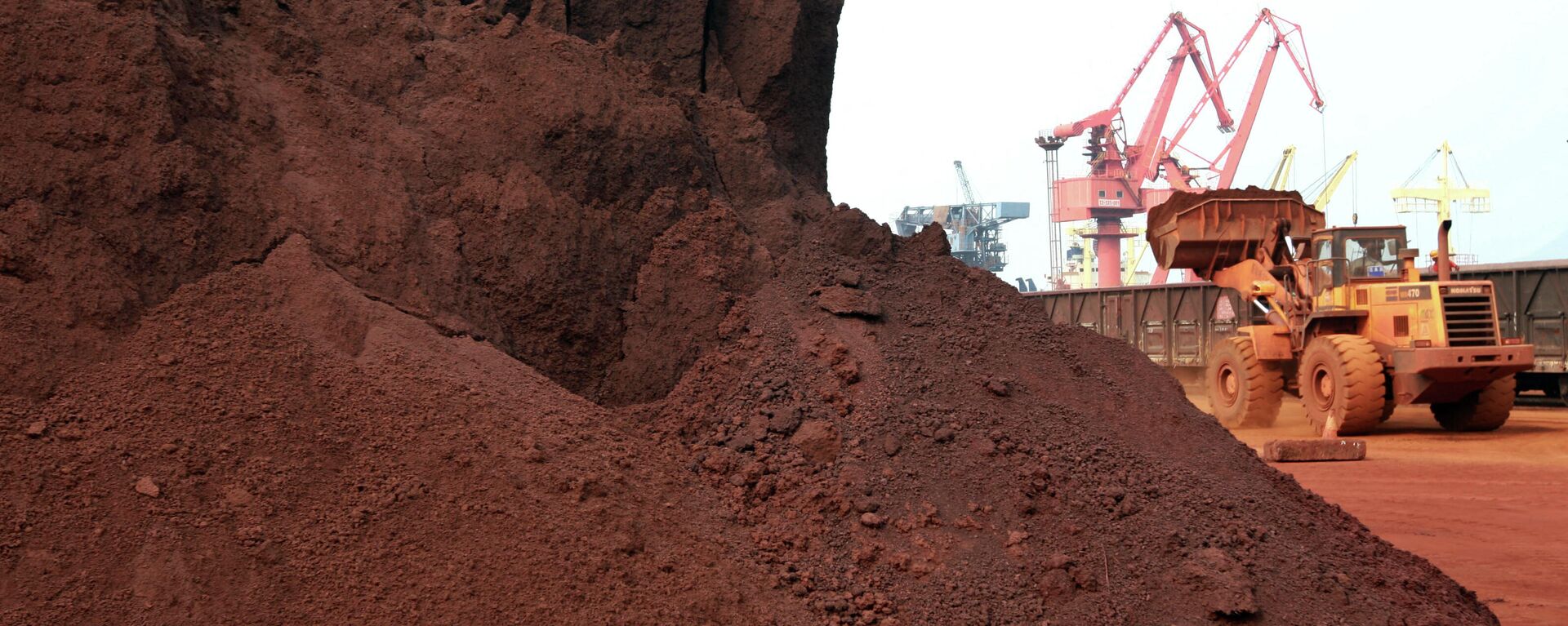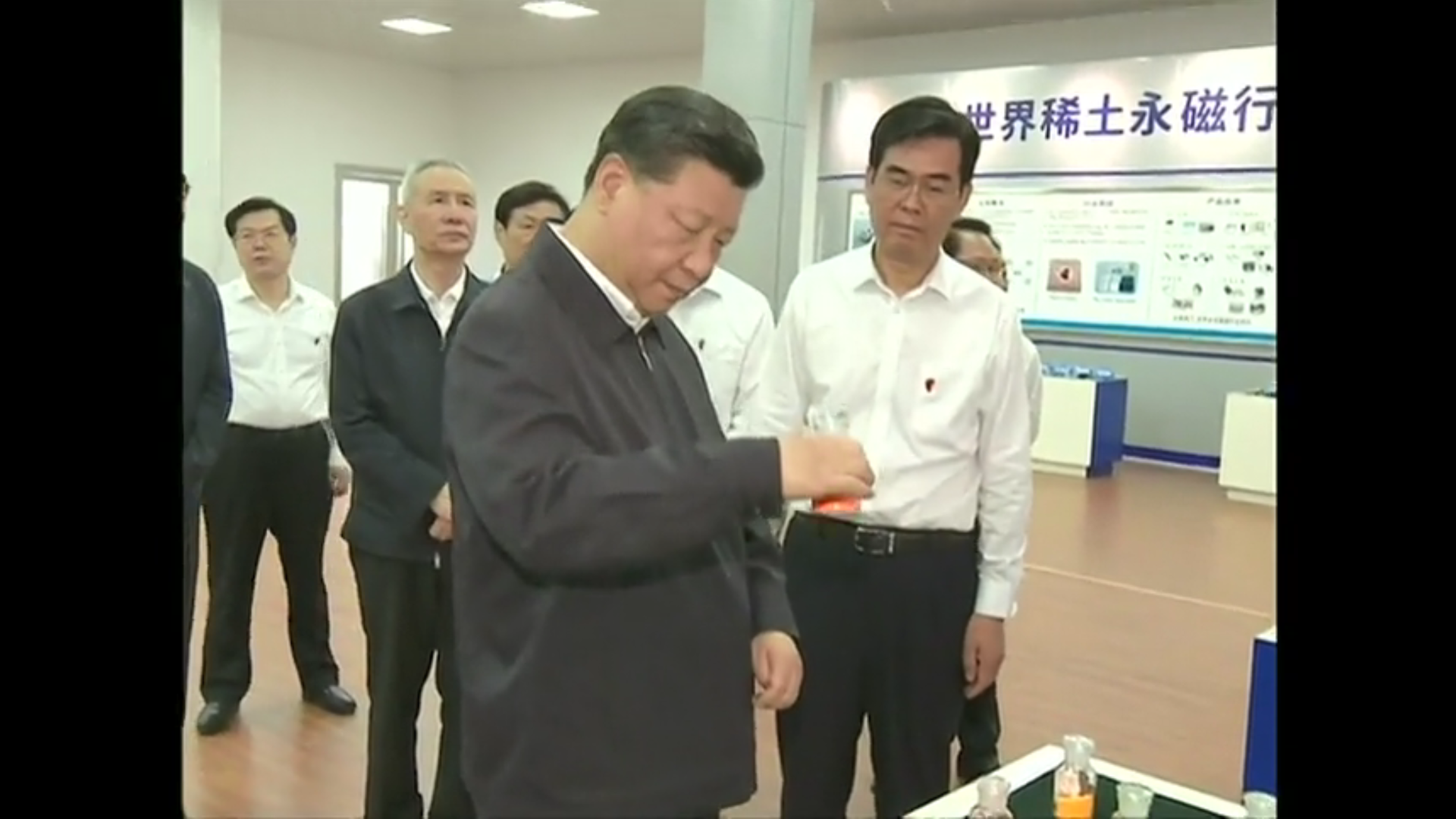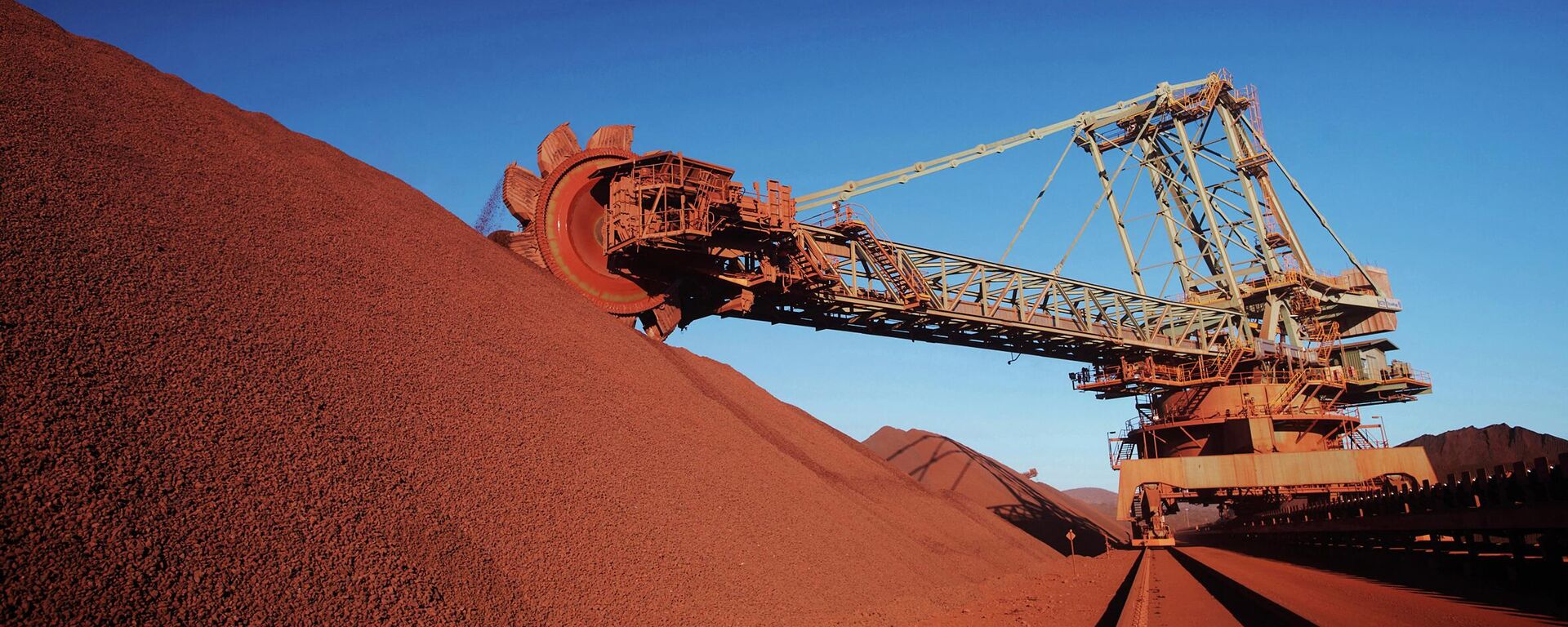https://sputnikglobe.com/20220605/prc-could-starve-us-military-industrial-complex-of-ability-to-build-weapons-with-one-move-report-1096026836.html
PRC Could Starve US Military-Industrial Complex of Ability to Build Weapons With One Move: Report
PRC Could Starve US Military-Industrial Complex of Ability to Build Weapons With One Move: Report
Sputnik International
The United States is the world’s largest exporter of armaments, accounting for more than 38 percent of international weapons sales between 2017 and 2021. The... 05.06.2022, Sputnik International
2022-06-05T11:55+0000
2022-06-05T11:55+0000
2022-06-05T12:09+0000
rare-earth metals
china
america
monopoly
military-industrial complex
https://cdn1.img.sputnikglobe.com/img/107524/53/1075245373_8:0:2552:1431_1920x0_80_0_0_1cbfb8bc6d1b8b17ef86b5bbb3033f6d.png
China’s control of nearly 90 percent of the world’s supply of rare earth minerals threatens to ground US military aircraft, halt American tanks in their tracks, prevent the country’s most advanced surface-to-air missiles from taking flight, and stop troops from communicating using their portable radios. Congress and the Pentagon are aware of the issue and want throw cash at the problem to solve it, according to a Fox News report.Late last month, lawmakers on the House Armed Services Committee asked for a special fund in the fiscal 2023 defence budget for rare earth minerals. The Pentagon itself is seeking a $253.5 million cash injection for the procurement of strategic minerals, including titanium, tungsten, and cobalt.Senate Armed Services Committee lawmakers have put together their own bill, dubbed the REEShore Act, seeking both cash for minerals and government incentives to mine them in the USA.The bipartisan REEShore Act bill was cosponsored by Republican Tom Cotton and Democrat Mark Kelly, with Kelly, a retired astronaut, claiming he could actually see the impact of China’s rare earths mineral mining while flying in space.“I’ve flown in space over China many times, orbited this planet hundreds of times. You look down over China and you see like what looks like lakes of very strange colours. And it’s because that they’re processing of things like rare earth metals. It’s a very dirty process”, Kelly told Fox.Ronald Reagan Institute director Roger Zakheim complained that the US had effectively “given” China its monopoly in this area. “We’ve essentially ceded it to China and that impacts everything from our F-35 fighter aircraft to the phones that we use every day in our lives”, he said.Rare Earths HeadachesThe US was a global leader in rare earths production and processing for most of the 20th century, but ceded its position to China in the 1980s, with the PRC now controlling the vast majority of the market thanks to tightened US environmental regulations, globalisation, and warming US-China ties in the 1990s and 2000s.Amid the slow souring of relations starting in the mid-late 2010s, US officials and media began complaining about China’s dominance in rare earth minerals, with the issue brought up repeatedly during Washington’s trade wars with Beijing during Donald Trump’s presidency. Over the past three years, US officials and the Pentagon have announced a series of plans to diversify rare earths production and processing to Africa, Australia, and even the UK.The danger of a Chinese cutoff of US access to strategic minerals has garnered fresh attention under the Biden administration amid the heating up of tensions over a broad range of issues, from US commitments to Taiwan and the challenging of Chinese claims in the South China Sea to Beijing’s diplomatic support for Russia in the Ukraine crisis and unsettled trade and technology disputes.Chinese industry experts have dismissed the US’ ability to quickly or easily replace the Asian nation’s rare earths, with Renmin University of China researcher Chen Xiaoqin telling Sputnik in 2019 that if the Americans could find an alternative to Chinese supplies, they would have done so a long time ago.Drew Horn, a former US Army Green Beret-turned-founder of GreenMet, a US hedge fund investing in securing strategic rare earth minerals, told Fox it would take a tremendous amount of effort for the US to challenge China's hegemony in this sector. "It's incredibly difficult to synchronise and bring all of it together in a way that actually moves the needle. Because what you're talking about is essentially creating a vertically aligned supply chain that now only exists in China", he complained.
https://sputnikglobe.com/20220115/us-lawmakers-mull-banning-defence-contractors-from-buying-chinese-rare-earths-1092282712.html
https://sputnikglobe.com/20220513/pentagon-urges-congress-to-allow-funding-of-rare-earths--mineral-processing-in-uk-australia-1095494498.html
china
Sputnik International
feedback@sputniknews.com
+74956456601
MIA „Rosiya Segodnya“
2022
News
en_EN
Sputnik International
feedback@sputniknews.com
+74956456601
MIA „Rosiya Segodnya“
Sputnik International
feedback@sputniknews.com
+74956456601
MIA „Rosiya Segodnya“
rare-earth metals, china, america, monopoly, military-industrial complex
rare-earth metals, china, america, monopoly, military-industrial complex
PRC Could Starve US Military-Industrial Complex of Ability to Build Weapons With One Move: Report
11:55 GMT 05.06.2022 (Updated: 12:09 GMT 05.06.2022) The United States is the world’s largest exporter of armaments, accounting for more than 38 percent of international weapons sales between 2017 and 2021. The Pentagon is also the US military-industrial complex’s single largest buyer, with its $801 billion in military spending dwarfing that of all of Washington’s major adversaries combined.
China’s control of nearly 90 percent of the world’s supply of rare earth minerals threatens to ground US military aircraft, halt American tanks in their tracks, prevent the country’s most advanced surface-to-air missiles from taking flight, and stop troops from communicating using their portable radios. Congress and the Pentagon are aware of the issue and want throw cash at the problem to solve it, according to a Fox News
report.
Late last month, lawmakers on the House Armed Services Committee asked for a special fund in the fiscal 2023 defence budget for rare earth minerals. The Pentagon itself is seeking a
$253.5 million cash injection for the procurement of strategic minerals, including titanium, tungsten, and cobalt.
Senate Armed Services Committee lawmakers have put together their own bill, dubbed the REEShore Act, seeking both cash for minerals and government incentives to mine them in the USA.
The bipartisan REEShore Act bill was cosponsored by Republican Tom Cotton and Democrat Mark Kelly, with Kelly, a retired astronaut, claiming he could actually see the impact of China’s rare earths mineral mining while flying in space.
“I’ve flown in space over China many times, orbited this planet hundreds of times. You look down over China and you see like what looks like lakes of very strange colours. And it’s because that they’re processing of things like rare earth metals. It’s a very dirty process”, Kelly told Fox.
Cotton warned that the Pentagon’s existing rare earths stockpiles would last "under a year" if China cut off supplies.
Ronald Reagan Institute director Roger Zakheim complained that the US had effectively “given” China its monopoly in this area. “We’ve essentially ceded it to China and that impacts everything from our F-35 fighter aircraft to the phones that we use every day in our lives”, he said.

15 January 2022, 17:56 GMT
The US was a global leader in rare earths production and processing for most of the 20th century, but
ceded its position to China in the 1980s, with the PRC now controlling the vast majority of the market thanks to tightened US environmental regulations, globalisation, and warming US-China ties in the 1990s and 2000s.
Amid the slow souring of relations starting in the mid-late 2010s, US
officials and
media began complaining about China’s dominance in rare earth minerals, with the issue
brought up repeatedly during Washington’s trade wars with Beijing during Donald Trump’s presidency. Over the past three years, US officials and the Pentagon have announced a series of
plans to diversify rare earths production and processing to
Africa,
Australia, and even
the UK.
The danger of a Chinese cutoff of US access to strategic minerals has garnered fresh attention under the Biden administration amid the heating up of tensions over a broad range of issues, from US
commitments to Taiwan and the
challenging of Chinese claims in the South China Sea to Beijing’s
diplomatic support for Russia in the Ukraine crisis and unsettled trade and technology
disputes.
Chinese industry experts have
dismissed the US’ ability to quickly or easily replace the Asian nation’s rare earths, with Renmin University of China researcher Chen Xiaoqin telling Sputnik in 2019 that if the Americans could find an alternative to Chinese supplies, they would have done so a long time ago.
Drew Horn, a former US Army Green Beret-turned-founder of GreenMet, a US hedge fund investing in securing strategic rare earth minerals, told Fox it would take a tremendous amount of effort for the US to challenge China's hegemony in this sector. "It's incredibly difficult to synchronise and bring all of it together in a way that actually moves the needle. Because what you're talking about is essentially creating a vertically aligned supply chain that now only exists in China", he complained.





